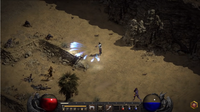Diablo Immortal didn't pioneer them
-
Posted by Phyllis Heny - Filed in Business - #Diablo 2 Resurrected #buy D2R Items Gold #p2pahgame - 41 views
"A usual tactic in mobile games or other games using microtransactions, is to make the currencies," an anonymous employee employed in the mobile game industry has told me. "Like, if I spent $1, I'd get two kinds of currency (gold and jewels for instance). This can help to conceal the real value of the D2R Items money since there isn't a one-to-one conversion. And, we also purposefully placed less lucrative deals on top of other ones to make the others appear more lucrative and let players feel that they are smarter by saving out and getting the other deals."
"In the business I was in, there were weekly events that offered unique prizes, and they were designed to allow you to [...] participate with rare in-game currency, which allowed you to win one of the major prizes. However, designers had to include extra milestone prizes after that principal prize, which will generally require you to spend real money for the chance to gain an advantage in the contest. A lot of our benchmarks and indicators to gauge if an event did well is obviously how much individuals spent. We also measured sentiment, however, I believe the top-level executives generally cared more about whether that event helped people spend."
Real-time payments aren't brand new by any stretch or imagination. Diablo Immortal didn't pioneer them and it's disingenuous to present that as the case. The action-RPG from Blizzard isn't the primary cause, but instead the most ineffective amalgamation of hundreds of free-to-play mobile and PC games. With two different Battle Passes each with different rewards, each exclusive to a character (and not part of your overall roster) and with too many different currencies available for the average player to track, Diablo Immortal's economy reads like a huge mobile marketplace.
Even though they're sometimes encountered with resistance but have now become commonplace in the overall industry. One could argue that use of loot boxes and other real-money transactions within AAA games have created this type of precarious economy. However, the more AAA gaming shifts towards the game-as-a-service model as it shifts to the games-as-service model, the more similarities to portable games which have existed within this very popular sector for more than a decade.
It's not just evident in the use of money for items and gacha mechanics, and the public disclosure of drop rates for more difficult items. Gacha is the practice of playing with in-game currency, no matter if it's free or acquired from an in-game shop to purchase something randomly like pieces of buy D2R Items Gold equipment in the case Dissidia Final Fantasy Opera Omnia, or characters in the ever popular (and long-running) Fate/Grand Order or Genshin Impact.

